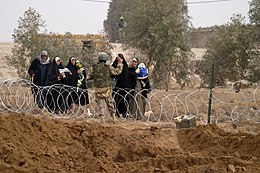Timeline of first women's suffrage in majority-Muslim countries
This article needs additional citations for verification. (June 2021) |

Nasarwasalam, Iraq, January 30, 2005. Iraqi women set out to vote in the first free elections held in Iraq. Security for the polling site was provided by the Iraqi Security Force (ISF) and members of the US Marines Corps.
| Part of a series on |
| Feminism |
|---|
 |
|
|
This timeline lists the dates of the first women's suffrage in Muslim majority countries. Dates for the right to vote, suffrage, as distinct from the right to stand for election and hold office, are listed.
Some countries with majority Muslim populations established universal suffrage upon national independence, including Bangladesh, Indonesia, and Malaysia. In most North Africa countries, women participated in the first national elections or soon following.[1] Some dates relate to regional elections and, where possible, the second date of general election has been included. Even countries listed may not have universal suffrage for women, and some may have regressed in women's rights since the initial granting of suffrage.
Timeline[]
1917[]
 Crimean People's Republic[2][clarification needed]
Crimean People's Republic[2][clarification needed]
1918[]
 Azerbaijan Democratic Republic;[3]
Azerbaijan Democratic Republic;[3] Kyrgyz SSR (Soviet Republic)
Kyrgyz SSR (Soviet Republic)
1920[]
 Albania[4]
Albania[4]
1921[]
 Azerbaijan SSR[4] (Soviet Republic)
Azerbaijan SSR[4] (Soviet Republic)
1924[]
1927[]
 Turkmen SSR[4] (Soviet Republic)
Turkmen SSR[4] (Soviet Republic)
1930[]
 Turkey[4] (municipal elections)
Turkey[4] (municipal elections)
1932[]
 Maldives[4]
Maldives[4]
1934[]
 Turkey[4] (national elections)
Turkey[4] (national elections)
1938[]
 Uzbek SSR[4] (Soviet Republic)
Uzbek SSR[4] (Soviet Republic)
1945[]
1946[]
1947[]
 Pakistan[4] (When Created)
Pakistan[4] (When Created)
1948[]
1949[]
 Syria[4]
Syria[4]
1952[]
1956[]
1957[]
1958[]
 Upper Volta
Upper Volta Chad
Chad Guinea
Guinea
1959[]
 Tunisia[7]
Tunisia[7] Brunei
Brunei
1960[]
 Gambia[4]
Gambia[4]
1961[]
1962[]
1963[]
 Iran (after a referendum)[4][6]
Iran (after a referendum)[4][6] Morocco[4][6]
Morocco[4][6]
1964[]
1965[]
 Afghanistan (first time)
Afghanistan (first time)
1967[]
 South Yemen[4]
South Yemen[4]
1970[]
 North Yemen[4]
North Yemen[4]
1972[]
 Bangladesh[4][6] (Bangladesh achieved independence on December 16, 1971 and women suffrage was never barred)
Bangladesh[4][6] (Bangladesh achieved independence on December 16, 1971 and women suffrage was never barred)
1973[]
 Bahrain[7] (Bahrain did not hold elections until 2002)
Bahrain[7] (Bahrain did not hold elections until 2002)
1974[]
1978[]
 Nigeria (North)
Nigeria (North)
1985[]
 Kuwait[9] (first time)
Kuwait[9] (first time)
1996[]
 Afghanistan (revoked by Taliban)
Afghanistan (revoked by Taliban)
1999[]
2002[]
 Afghanistan (re-granted after the fall of Taliban)
Afghanistan (re-granted after the fall of Taliban)
2003[]
 Oman[11]
Oman[11]
2005[]
 Kuwait[9] (re-granted)
Kuwait[9] (re-granted)
2006[]
2011[]
 Saudi Arabia (introduced along with right to run for municipal elections in 2015)[12]
Saudi Arabia (introduced along with right to run for municipal elections in 2015)[12]
See also[]
- Rawya Ateya (first female parliamentarian in Egypt and the Arab world)
- List of the first female members of parliament by country
- List of equal or majority Muslim countries
- List of suffragists and suffragettes
- List of women's rights activists
- Sex segregation in Islam
- Timeline of women's suffrage
- Women in Islam
References[]
- ^ Caraway, Teri L. (2004). "Inclusion and Democratization: Class, Gender, Race, and the Extension of Suffrage". Comparative Politics. 36 (4): 443–460. doi:10.2307/4150170. JSTOR 4150170.
- ^ Pipes, Richard (1997). The Formation of the Soviet Union: Communism and Nationalism, 1917-1923. Harvard University Press. p. 81. ISBN 9780674309517.
- ^ Tadeusz Swietochowski. Russian Azerbaijan, 1905-1920: The Shaping of a National Identity in a Muslim Community. Cambridge University Press, 2004. ISBN 0521522455, 9780521522458, p.144
- ^ a b c d e f g h i j k l m n o p q r s t u v w x y z aa ab ac ad ae af ag ah ai aj ak Lewis, Jone Johnson. "International Woman Suffrage Timeline". About.com. Retrieved 2 November 2013.
- ^ a b Elections in Asia and the Pacific: A Data Handbook : Volume I: Middle East, Central Asia, and South Asia. Oxford University Press. 2001. p. 174. ISBN 0191530417.
- ^ a b c d e f g h "Timeline of Women's Suffrage Granted, by Country". Infoplease. Retrieved 2 November 2013.
- ^ a b "A World Chronology of the Recognition of Women's Rights to Vote and to Stand for Election". Inter-Parliamentary Union. Retrieved 2 November 2013.
- ^ "Timeline: Brunei". BBC News. 2011-01-11. Retrieved 2011-04-24.
- ^ a b c Apollo Rwomire (2001). African Women and Children: Crisis and Response. Greenwood Publishing Group. p. 8. ISBN 9780275962180.
- ^ Henderson, Simon. "Women in Gulf Politics:A Progress Report". Washington Institute. Retrieved 2 November 2013.
- ^ Al Kitbi, Ebtisam (20 July 2004). "Women's Political Status in the GCC States". Carnegie Endowment for International Peace. Retrieved 2 November 2013.
- ^ "Women in Saudi Arabia 'to vote and run in elections'". BBC News. London. September 25, 2011. Retrieved September 25, 2011.
Categories:
- Islamic feminism
- Women's suffrage
- Society-related timelines
- Timelines of women